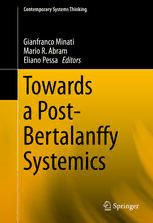
Towards a Post-Bertalanffy Systemics PDF
Preview Towards a Post-Bertalanffy Systemics
Contemporary Systems Thinking Gianfranco Minati Mario R. Abram Eliano Pessa Editors Towards a Post- Bertalanff y Systemics Contemporary Systems Thinking SeriesEditor: RobertL.Flood MaastrichtSchoolofManagement TheNetherlands Moreinformationaboutthisseriesathttp://www.springer.com/series/5807 Gianfranco Minati • Mario R. Abram Eliano Pessa Editors Towards a Post-Bertalanffy Systemics 123 Editors GianfrancoMinati MarioR.Abram AIRS/ItalianSystemsSociety AIRS/ItalianSystemsSociety Milano,Italy Milano,Italy ElianoPessa UniversityofPavia Pavia,Italy ISSN1568-2846 ContemporarySystemsThinking ISBN978-3-319-24389-4 ISBN978-3-319-24391-7 (eBook) DOI10.1007/978-3-319-24391-7 LibraryofCongressControlNumber:2015959573 SpringerChamHeidelbergNewYorkDordrechtLondon ©SpringerInternationalPublishingSwitzerland2016 Thisworkissubjecttocopyright.AllrightsarereservedbythePublisher,whetherthewholeorpartof thematerialisconcerned,specificallytherightsoftranslation,reprinting,reuseofillustrations,recitation, broadcasting,reproductiononmicrofilmsorinanyotherphysicalway,andtransmissionorinformation storageandretrieval,electronicadaptation,computersoftware,orbysimilarordissimilarmethodology nowknownorhereafterdeveloped. Theuseofgeneraldescriptivenames,registerednames,trademarks,servicemarks,etc.inthispublication doesnotimply,evenintheabsenceofaspecificstatement,thatsuchnamesareexemptfromtherelevant protectivelawsandregulationsandthereforefreeforgeneraluse. Thepublisher,theauthorsandtheeditorsaresafetoassumethattheadviceandinformationinthisbook arebelievedtobetrueandaccurateatthedateofpublication.Neitherthepublishernortheauthorsor theeditorsgiveawarranty,expressorimplied,withrespecttothematerialcontainedhereinorforany errorsoromissionsthatmayhavebeenmade. Printedonacid-freepaper SpringerInternationalPublishingAGSwitzerlandispartofSpringerScience+BusinessMedia(www. springer.com) Preface ThetitleofthesixthnationalconferenceoftheItalianSystemsSociety,“Towardsa post-BertalanffySystemics”,aimstounderlinetheneedforSystemicsandSystems Sciencetogeneralizetheoretically,interdisciplinarilyandtrans-disciplinarilyusing systemic concepts arising from the original or Bertalanffy Systemics, as well as fromvariousdisciplinesthemselves. The topic of this sixth conference is an evolution of the subjects of previous conferences,namely: • 2002EmergenceinComplexCognitive,SocialandBiologicalSystems • 2004SystemicsofEmergence:ResearchandApplications • 2007 Processes of Emergence of Systems and Systemic Properties—Towards a GeneralTheoryofEmergence • 2011Methods,Models,SimulationsandApproachesTowardsaGeneralTheory ofChange ConsiderationwasmadeofthegenericfirstphaseofSystemicsdevotedtoover- coming classical mechanistic views, introducing new theoretical approaches stud- ied, for instance, through Automata Theory, Catastrophe Theory, Chaos Theory, Control Theory, Cybernetics, Games Theory, Systems Dynamics, Gestalt, Socio- biology and Theory of Dynamical Systems. This phase can be characterized by theterm“GeneralSystemTheory”,introducedbyLudwigvonBertalanffy(1901– 1972) to generalize the concept of system by using some key systemic concepts suchasinteraction,generalinterdependence,opennessandcloseness,organization and homeostasis within the general framework of the isomorphism between sci- ences, searching for the unity of science. This phase continues but, over the past fewyears,twoimportantculturalandscientificprocessesareoccurring: • After Systemics used the concept of system and related properties to over- come classical disciplines still tied to principles such as determinism, mecha- nistic view, summative assumption and linearity, reversibility, single optimum and equilibrium points, the disciplines themselves used in innovative ways the concept of system by introducing theoretical improvements. Examples are givenbyadvancesindisciplinarydomainssuchasTheoreticalPhysics,Biology, v vi Preface Neuroscience, Experimental Economics and Network Science, the latter being evenapossiblenewversionofSystemicsitselfduetoitsgenerality.Theconcepts andapproachesconsideredbyvariousdisciplinesusingsystemicapproachesare extremelyinnovativeandbegfortheirgeneralization. • Phenomena are being considered and denoted in different ways, in various disciplines, using different approaches, but all are related to complexity, self- organization and emergence. However, all approaches considered by Systemics have a post-reductionist nature since they are unable to deal, for instance, with coherence and multiple coherences, dynamic structures, multiple models, non- homogeneity, nonequivalences, levels of distinguishability, multiple systems, powerlawsandscale-freeproperties. WhencetheoriginalSystemicsissuitablefordealingwithprocessesofacquir- ing and maintaining the same or only a few, fixed systemic properties. Complex open systems, on the contrary, continuously acquire new, multiple, superimposed andoftendelocalizedcoherentsequencesofproperties. Today it is extremely difficult to find disciplinary areas where the concept of systemisnotfrequentlyused,albeitwithinspecificcontexts. Indeed today disciplines have become sources, suppliers of new approaches, problemsandsystemicissues. The interdisciplinary nature of the original Systemics and its power of gener- alization were given, overall, by the fact that the problems and solutions of one disciplinebecomeproblemsandsolutionsforanother.Today,themodellingandin- terpretationofmultidisciplinaryapproachesandrepresentationsfacilitatethis.The context,however,haschangeddramatically. Thisyear’sconferencewasdevotedtoidentifying,discussingandunderstanding possible interrelationships of theoretical disciplinary improvements recognized as havingprospectivefundamentalrolesforanewpost-BertalanffySystemicsableto deal with problems of complexity in a generalized way where interdisciplinarity consists,forinstance,inadisciplinaryreformulationofproblems,asfromalgebraic to geometrical, from military to political, from biological to chemical, and trans- disciplinarity is related to the study of such reformulations and their properties. Examples of new issues introduced by such theoretical disciplinary improvements andstudiedwithinvariousdisciplinesinclude: Between(themesoscopicmiddleway) Non-prescribability Environment Non-separability Equivalence Ontologies,scenariosandmetamodels Fractality Powerlaws Individuality Pre-properties Inductionofproperties Propagation Irreversibility Quantumtheoriesandconcepts Meta-structuralproperties Quasiproperties Methodsandmodelstobuildstrategies Quasiness Multiple,dynamiccoherence Symmetry Mutation Structuraldynamics Preface vii Networks Structuralregimesofvalidity Non-causality Systempropagation Nonequivalence Topologicaldynamics Non-invasiveness Transient Thenewinterdisciplinarityrelatestopropertiesofnewrepresentations,asinNet- workSciencewhendealingwithtopology,smallworldness,powerlawsandfitness. Whatisourroleasadynamicalopennetworkeventhoughofficiallywearean association? The challenge is still theoretical generalization and application, even where we havealotofspecificities,butknowverylittleonhowtocombinethem. Itisnotsimplyreplacing theoldwiththenew, but todevelop strategies torec- ognize, represent, model and act on new levels and combine, by considering, for example,multiplerepresentations,functionsandemergence. Invariousdisciplinesthisisalreadydone,andinevitablywell,sincetargetsand projectsarewellspecifiedandoriented. ThechallengeistodoitforSystemics,withthevocationsofculturalandtheo- reticalgeneralization.Thesubjectmatterwasexploredthroughfivesessions: 1. StudiesofEmergence,ModelsandSimulations 2. TheContributionofPhysicstoaNewGeneralTheoryofSystems 3. NewSystemicContentsofDisciplinaryApproachesandProblems 4. NewFormsofInter-andTrans-disciplinarity 5. OutlinesofaNewGeneralTheoryofSystems TheconferencewasopenedwiththeplenarylecturebyEmeritusProfessorFor- tunatoTitoArecchi,entitled“QuantumEffectsinLinguisticEndeavors”. We conclude by mentioning that the Italian Systems Society does not want to perpetuate a role but, rather, contribute to the context-sensitive emergence of new, eventuallycollective,rolesinanagewheredisciplineshaveaveryhightheoretical and applicative specialized systemic content and high interdisciplinarity but still requiretheoreticalgeneralizationsandsuitablegeneralizedapproachessuchasthose studied by Network and Quantum Science as listed above. Systemics should also considersuitableculturalversionsofsuchissues. Milano,Italy GianfrancoMinati Milano,Italy MarioR.Abram Pavia,Italy ElianoPessa April2015 Acknowledgements ThesixthItalianconferencehasbeenpossiblethankstothecontributionsofmany peoplewhohaveaccompaniedandsupportedthegrowthanddevelopmentofAIRS during all the years since its establishment in 1985 and to the contribution of new energies from students and researchers realizing the systemic aspects of their activity. WehavebeenhonouredbythepresenceofProfessorFortunatoTitoArecchiwho deliveredtheopeningplenarylecture. WethankARTEMISNEUROSCIENCES,Rome,whosponsoredtheconference. We thank the PONTIFICAL ATHENEUM S. ANSELMO for hosting the con- ference. Thanksarealsoduetoalltheauthorswhosubmittedpapersforthisconference andinparticularthemembersoftheprogrammecommitteeaswellasthereferees whohaveguaranteedthequalityoftheevent. We thank explicitly all the people who have contributed during the conference, bringingideasandstimulitothisnewphaseofthescientificandculturalprojectof Systemics. ix
